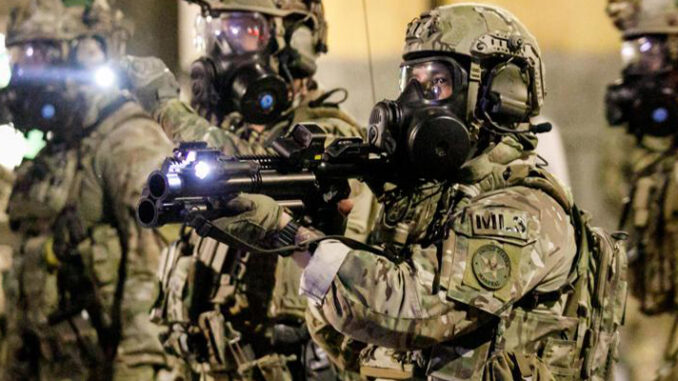
by Michael Chertoff
The Trump administration’s deliberate decision to intervene in the Portland protests with a heavy hand, unconventional means and inflammatory political rhetoric has contributed to growing public distrust — particularly of the Department of Homeland Security.
Critics of the department are now rightly worried that its law enforcement agents might be increasingly deployed by President Trump to score political points, or even interfere with the November election.
These actions, now or into the future, endanger our democracy, and undermine the nation’s safety — by hurting the department’s ability to carry out its core mission of protecting Americans from genuine threats to our security.
Homeland Security was created after the Sept. 11 terror attacks with the goal of unifying the government’s efforts to combat emerging security threats. Over the years, these threats have grown to include not only international and domestic terrorism, but also natural disasters, pandemics and cyberattacks.
Given that extensive mandate, the department can’t do it alone; it needs help from state and local governments and the private sector. Through joint intelligence centers, the agency shares threat information with state and local authorities. Similarly, the department’s cybersecurity agency can carry out its mission only by working with businesses that operate critical infrastructure like the electric grid.
This cooperation rests on a critical foundation: public trust. Other government officials, private businesses and citizens will cooperate only if they are confident that the department is focused on legitimate security objectives, with strict fidelity to the Constitution and the rule of law.
For these reasons, the department’s leadership and direction over its first dozen years was studiously bipartisan. Indeed, early concerns that the department was too heavy-handed with aviation and border security measures reinforced leadership’s commitment to impartiality and avoidance of political rhetoric.
Even now, many parts of the department faithfully honor their public obligations. For example, cybersecurity works closely and effectively with state and local election officials and with the private sector, like power companies, that operates our critical infrastructure against foreign adversaries. The Transportation Security Administration also carries out its aviation security responsibilities professionally and effectively.
But now other elements of the department are putting the public trust at risk. While it was appropriate for the department’s personnel to deploy to protect the Portland federal courthouse against threats by some violent actors, the tactics actually employed looked heavy-handed and dismissive of legal constraints. Videos reveal agents operating in camouflage uniforms with no clear identifying insignia. That may be appropriate combating transnational drug gangs in a border environment, but not in American cities. Other videos and reports make clear that even peaceful demonstrators — such as individuals identifying as military veterans — were struck with nonlethal projectiles and strong tear gas. And there was no respect for, or coordination with, the wishes of local authorities.
One might criticize these moves as errors in judgment, but for the fact that White House statements demonstrate the president reveling in the use of brutal and aggressive force, especially in cities that he characterizes as governed by liberal Democratic mayors. And if the politically performative aspect of this policy were not already obvious, it is rendered unmistakable when footage of the mayhem is broadcast by Trump campaign commercials.
Other troubling examples of disdain for the law were also evident this summer. When the Supreme Court invalidated the administration’s moves to repeal DACA, which allows childhood immigrants to apply for legal status, Homeland Security stopped processing applications, essentially defying the ruling. And the department was forced to retreat from its effort to deny New Yorkers participation in trusted-traveler programs when it emerged that officials had falsely claimed that state policy on sharing driver’s license information created security risks.
It is past time for the leadership of Homeland Security to firmly and unequivocally reject efforts to hijack the agency for political purposes. The commitment to the rule of law and to restrained and measured operational behavior must be articulated and carried out. That is especially true as we approach a critical election, to avoid any concern that agents of the department might be deployed to inhibit or frighten certain citizens from going to the polls.
The department’s leadership can look to emulate a recent, inspiring example. This past June, during demonstrations at Lafayette Square, opposite the White House, President Trump had federal police violently clear the park so that he could pose for a photo opportunity while accompanied by Defense Secretary Mark Esper and Gen. Mark A. Milley, chairman of the Joint Chiefs of Staff.
Afterward, Secretary Esper and General Milley had second thoughts and regretted their presence at the event. Both of these Defense Department leaders made explicit and unequivocal statements affirming for their department that the military’s primary loyalty is to the Constitution of the United States and that it must remain apart from politics.
While the Defense Department has developed its values and culture over decades, the leadership of Homeland Security under Presidents George W. Bush and Barack Obama worked hard to articulate and instill these same core concepts of remaining apolitical and nonpartisan. This president is pushing a culture of political loyalty that is inimical to these values. The department’s leadership should step up and reaffirm the importance of measured, lawful and transparent execution of its appropriate missions.
Michael Chertoff served as secretary of homeland security under President George W. Bush.
.
